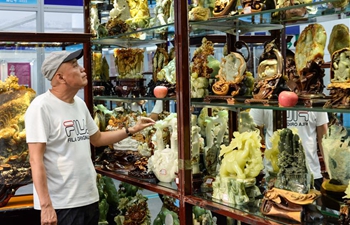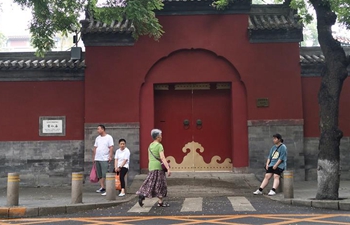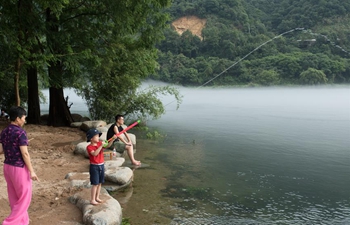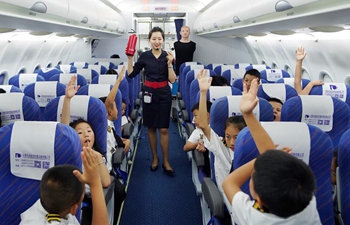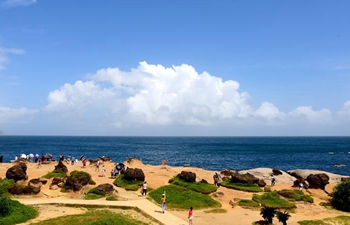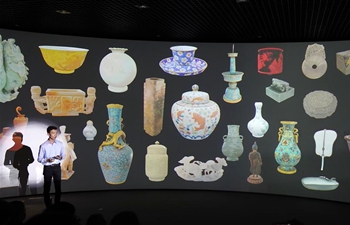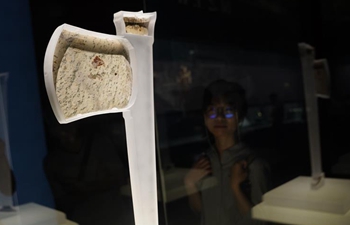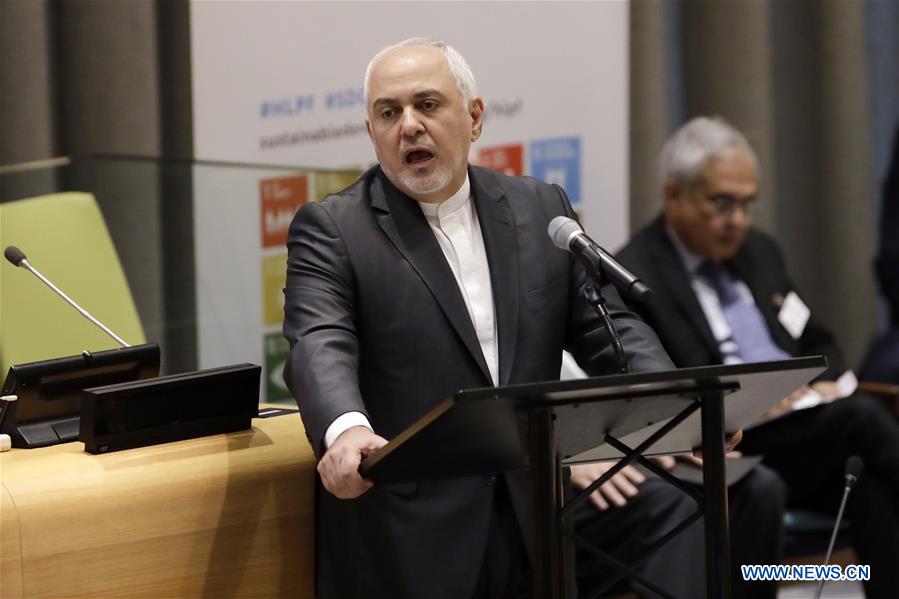
Iranian Foreign Minister Mohammad Javad Zarif addresses the General Debate of the High-level Segment of the Economic and Social Council (ECOSOC) Ministerial Segment of the High-level Political Forum on Sustainable Development, at the UN headquarters in New York, July 17, 2019. Javad Zarif on Wednesday told a United Nations high-level meeting that Iranian people are subjected to the most brutal form of "economic terrorism." (Xinhua/Li Muzi)
UNITED NATIONS, July 17 (Xinhua) -- Iranian Foreign Minister Mohammad Javad Zarif on Wednesday told a United Nations high-level meeting that Iranian people are subjected to the most brutal form of "economic terrorism."
"Regional threats and insecurity caused by foreign-sponsored terrorism, extremism and violence, hamper our efforts. Our people are also subjected to the most brutal form of 'economic terrorism' -- deliberately targeting innocent civilians to achieve illegitimate political objectives," Zarif told the ministerial meeting at the UN headquarters in New York on sustainable development goals (SDGs), which aim to tackle issues including conflict, hunger, gender equality and climate change by 2030.
"The unlawful extraterritorial economic sanctions imposed on Iran by the United States in violation of Security Council Resolution 2231 represent the greatest threat to the achievement of sustainable development goals of Iran and many of our neighbors," he noted.
"A renewed commitment to multilateralism and global solidarity is urgently needed. This should also entail, among others, the developed world re-visiting its commitment to help create an enabling environment for sustained economic growth and sustainable development of all countries, regions, and ultimately the planet as a whole," said the foreign minister, who arrived in New York on Sunday.
UN Secretary-General Antonio Guterres' report about the progress of the implementation of the 2030 Agenda for SDGs indicates sluggish progress in many areas, and underlines "that the most vulnerable people and countries continue to suffer the most and that the global response thus far has not been ambitious enough," Zarif said.
He also echoed the secretary-general's remarks that "inequality between and within countries is disturbingly high" and that "development is not sustainable if it is not fair and inclusive."
"Failure so far can be attributed to the failure of the developed world in keeping their side of the bargain, including those related to transfer of technology, capacity building and financial assistance," he said.
Referring to Iran's efforts and progress in implementing the SDGs, Zarif said that in spite of "huge impediments" caused by unlawful unilateral sanctions, Iran has made "significant progress" in people's empowerment and equality, working on the basis of its own principles and national priorities: 27 percent of faculty members, 50 percent of college students and 37 percent of medical doctors are currently women.
"At the decision-making level, there has been a 60 percent increase in appointments in a bid to ensure our goal that by 2020, 30 percent of national decision makers are women," he added.
As for Iran's contribution to climate action, the foreign minister said that in the implementation of Iran's national "Comprehensive Low-Carbon Plan," the country "surpassed intended mitigation of greenhouse gas emission of 4 percent lower than BAU (Business-as-Usual)."
"Ending illiteracy and providing free public education has approached its full realization, and the literacy rate among Iranians is now at 97 percent of the population. An average of 15 percent of household expenditure is now spent on education," Zarif noted.
"Effective training for the socially harmed and disadvantaged groups, as well as for rural and nomad communities and prisoners, is now being offered. Educational opportunities have been extended to migrants and refugees, and currently 400,000 Afghan students are registered at local schools in Iran," he said.
In addition to such threats as "economic terrorism," the foreign minister admitted that Iran faces other challenges that include natural disasters, land degradation, desertification, and water scarcity.
U.S. Secretary of State Mike Pompeo said on Sunday that he had greenlighted a visa for Zarif to visit the UN headquarters in New York, adding that Zarif's movements will be largely confined.
Zarif and other members of the Iranian delegation will be allowed to travel between the UN headquarters and the Iranian mission, and to the residence of Iran's UN ambassador nearby, Pompeo told The Washington Post.
"U.S. diplomats don't roam around Tehran, so we don't see any reason for Iranian diplomats to roam freely around New York City, either," the Post quoted Pompeo as saying.
Farhan Haq, deputy spokesman for UN secretary-general, said Monday that the UN had told the United States that it was concerned over the restrictive travel measures imposed on Iran's foreign minister.
Since Washington pulled out of the 2015 Iran nuclear deal last year, relations between Iran and the United States have deteriorated with increasing tension seen in the Gulf of Oman, Persian Gulf and the Strait of Hormuz and the reinstatement of sanctions against Iran.
Zarif reportedly called on the European states to invest in measures to save the nuclear deal from falling apart, saying Tehran hasn't seen any move so far, as he arrived in New York on Sunday to take part in the high-level meeting, organized by the UN Economic and Social Council (ECOSOC).
Iran is a current ECOSOC member with its term ending in 2021.




